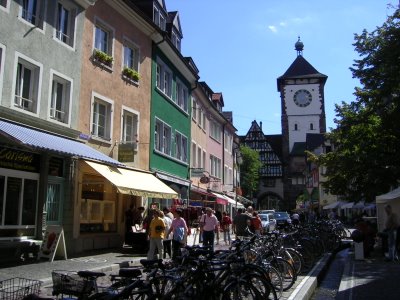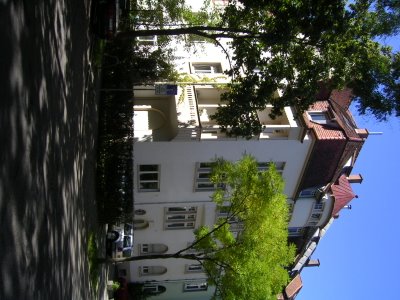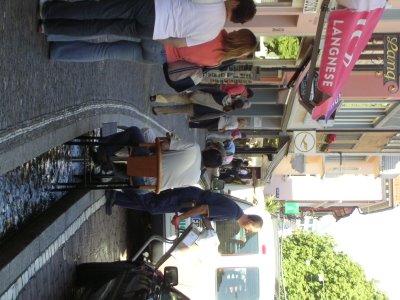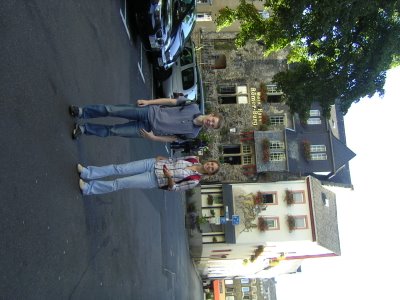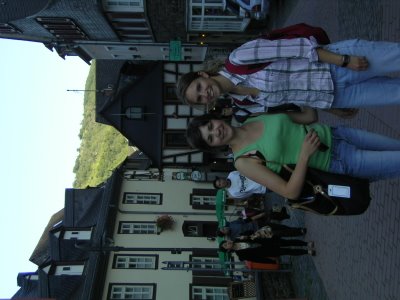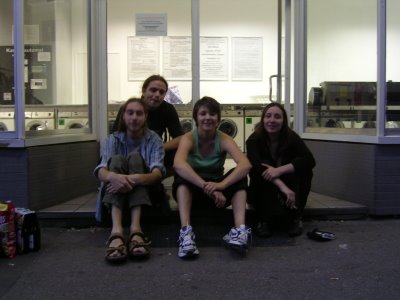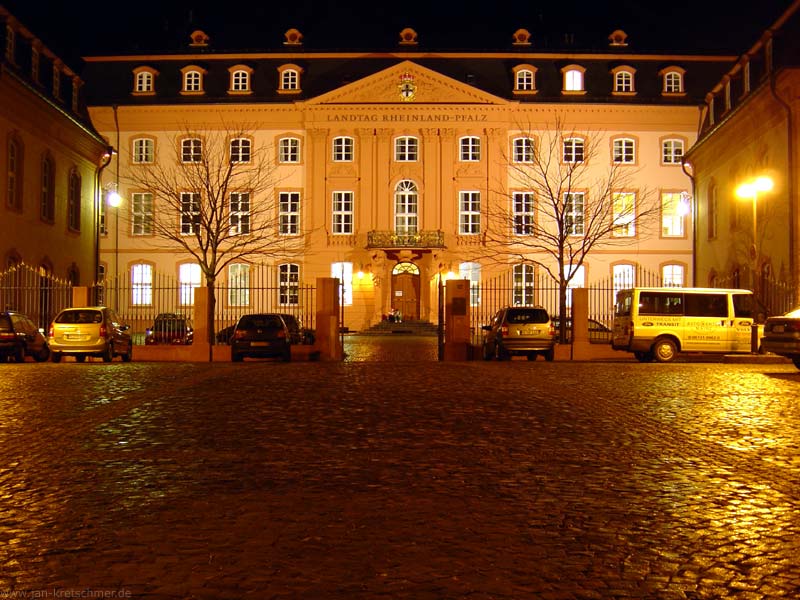Due to security reasons I am not able to connect my laptop to the internet either at work or at home, so the stuff I wrote about the last week or so in Freiburg and my beginnings in Mainz will have to be saved for a later date, and are here summarized:
1. Freiburg is “§$”§%” awesome. Love the city, absolutely gorgeous, nestled in a valley in the Black Forest. I now have an appartment, a bit, pretty one in an old mansiony type building in a pretty part of town. Three roommates, one bathroom, one WC, one kitchen, no living room. No furniture.
2. Mainz is pretty cool. I arrived on a Saturday, and Sunday I was sick and all the shops were closed, so I had no way to buy painkillers, no cooking or eating utensils, no internet, radio, or television. I have since more or less remedied all of these problems.
3. The internship is going well. I am mostly a research assistant, but I sometimes copy stuff, stuff envelopes, and help out at the events our department puts on. Our department is a bit chaotic and doesn’t need me so much, so I’ve been lent out to the protocoll and research department as an opportunity to get involved in the political side of the Landtag (my department is media and public relations. We put on art shows.)
If you’ve read this far, LEAVE ME A COMMENT. Even if it is just an alias and a smiley face. I base my self esteem on the number of comments I receive. The rest of this post may be a bit boring, as it just babbles on about what I do at my job.6 September
My day started with an appointment with Dr. Eginger, who is a protocoll advisor for the parliament and for the finance and (one other) committee. We spent perhaps an hour and a half discussing the federal system in Germany, how it works, its components, how laws are made and which body has influence where. We discussed the collection and distribution of taxes, the composition of state governments, functions of various departments and people, role of political parties, relations with the EU and the influence on state and federal politics, as well as, to a certain extent, comparison to the US and the UK.
Germany is a federal system composed of 16 states, Länder. The central government, the Bund, has an executive, the Bundesregierung (the chancellor, who is chosen by parliament), a parliament in the form of the Bundestag (our House of Representatives) whose members are selected in general elections via a two-vote system, and the Bundesrat (our Senate), composed of representatives of the different states, each with votes appropriate to their population.
The recent vote in Germany resulted in the Grand Coalition, the two opposition parties working together in order to form a majority, and also resulted in decreasing the amount of power the Bundesrat has over federal politics. Previously the Bundestag, the federal level, was subject to possible intervention by the Bundesrat (representatives, unlike our Senate, are chosen by the governments of the respective states, themselves chosen by state parliaments) in perhaps 2/3 of its policies and laws. Now the representatives of the states can interfere in perhaps 1/3 of the federal government’s politics. In exchange for relinquishing power over this approximate 1/3, the federal government relinquished power—completely—in several areas, which were turned over to the states to deal with as they wished.
State governments are responsible for carrying out the laws determined by the federal government, collects all taxes, and allocates the spending of those taxes returned to it by the Federal government. Thus, only one tax bureaucracy exists, at the state level, which means the states pay more attention to the collection of taxes which directly benefit them, the states, and less attention to those going completely to the federal government.
Dr. Edinger invited me to lunch and gave me a tour of the plenary room, and described a bit of how things work during the actual parliamentary sessions. His department is responsible for the agenda and for protocoll, and also investigates possible breaches of protocoll.
I spent some part of the afternoon working on Dr. Edinger’s assignment for me, which is to find out all state institutions, federally and at the state level, which deal with the integration of immigrants and migrants.
While I was in his deparment, however, I recieved another assignment from Dr. Pudlow, who oversees the EU and Agricultural committees. His task is to find out if the state government (the state minster’s office) had an obligation to inform the state parliament about a pending EU legislation regarding clean air standards. The EU functions in a manner such that a problem is to be solved at the lowest possible level, and if the lowest possible level declares itself incapable the matter is sent up the ladder. As a state, Rheinland-Pfalz is considered the lowest level of government concerned with EU decisions, and only if this state proves incapable is it sent up to the federal government. Because of the federal system and the consiberable distribution of power to the states, each German Land (state) has a representative in Brussels. In any case, regarding air quality standards, the state minister’s office did not inform the state politic, and the protocoll office is responsible for finding out if they should have done so, and I am personally responsible for finding out how other states (Länder) dealt with this issue. Thus: three inches of EU laws and protocoll documents.
After a quick hour off for dinner (I should have changed into my suit, but oh well) I attended/helped with an art showing put on by our department, featuring a local painter, a scupturist, and a selection of wines from local vinyards, all carefully selected to provide a careful balance of regional influence, support local industry, and place the parliament building more in the realm ‘’of the people.’’
7 September
My tasks for the day included one from my own department and the two I had been assigned the day before. First off, I was to write an article about the art show the night before, the names of the artists, the speakers, the time, the date, all that. I wasn’t sure where to start but I got it handled.
The rest of the morning was spent researching how many Landtage had been explicitly informed of the EU legislation: 3 of 16. Five further Landtage had somehow gotten wind of it and had addressed the issue, though there was no protocoll document specifically informing the Landtage in question. As part of the parliamentary process, members of the state legislative bodies have the right to address questions to their respective committees regarding pending legislation, current legislation, or any of a number of things. These questions are then addressed by the protocoll and research department in conjunction with committee members.
After lunch I spent the afternoon attempting to formulate a report on how the US handles immigration, eventually to focus on integration and assimilation programs. The report was in German, which meant I had to translate all the US government documents I found and wanted to cite, but therein lies the challenge.
After dinner, Linda and I went to an art show opening at the Bourgogne House, the ‘’consulate’’ of the French state of Burgundy, hosting a show by a french artist. We went to broaden our cultural horizons (and Linda has several friends who are either interns there, come from that area of France, or otherwise took part in the same seminar as she last week) but it soon became clear that the most we would get out of the evening was the wine and buffet.
The ‘art’ itself: Exhibit A was a skull, life sized, made of electric fence wire and somehow organized such that it doesn’t short. Anyways it was large, orange, and electrified.
Okay, well, if you insist.... Exhibit B consisted of a series of small sculptures, some representing known objects (a pretzle, a bird) others abstract, made of....electric fence wire.
Hmm, perhaps if I squint. Exhibit C was a large...stuffed....prostate....buffalo. In the middle of the floor.
So, how about some more wine?And I need to learn French. For a while, standing at the table with my wineglass, I was a linguistical outsider. The group to my left was conversing in French (some of them also spoke German, some not) and the group to my right was chatting in a mixture of Czech and Polish, with French and German mixed in. I was the only one of the group who could only speak two languages, and many of the rest of them could speak four or five. Grr.
